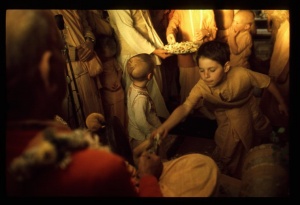SB 12.1.21-26

A.C. Bhaktivedanta Swami Prabhupada
Please note: The synonyms, translation and purport of this verse were composed by disciples of Śrīla Prabhupāda
TEXTS 21-26
- kṛṣṇa-nāmātha tad-bhrātā
- bhavitā pṛthivī-patiḥ
- śrī-śāntakarṇas tat-putraḥ
- paurṇamāsas tu tat-sutaḥ
- lambodaras tu tat-putras
- tasmāc cibilako nṛpaḥ
- meghasvātiś cibilakād
- aṭamānas tu tasya ca
- aniṣṭakarmā hāleyas
- talakas tasya cātma-jaḥ
- purīṣabhīrus tat-putras
- tato rājā sunandanaḥ
- cakoro bahavo yatra
- śivasvātir arin-damaḥ
- tasyāpi gomatī putraḥ
- purīmān bhavitā tataḥ
- medaśirāḥ śivaskando
- yajñaśrīs tat-sutas tataḥ
- vijayas tat-suto bhāvyaś
- candravijñaḥ sa-lomadhiḥ
- ete triṁśan nṛpatayaś
- catvāry abda-śatāni ca
- ṣaṭ-pañcāśac ca pṛthivīṁ
- bhokṣyanti kuru-nandana
SYNONYMS
kṛṣṇa-nāma — named Kṛṣṇa; atha — then; tat — of him (Balī); bhrātā — the brother; bhavitā — will become; pṛthivī-patiḥ — the master of the earth; śrī-śāntakarṇaḥ — Śrī Śāntakarṇa; tat — of Kṛṣṇa; putraḥ — the son; paurṇamāsaḥ — Paurṇamāsa; tu — and; tat-sutaḥ — his son; lambodaraḥ — Lambodara; tu — and; tat-putraḥ — his son; tasmāt — from him (Lambodara); cibilakaḥ — Cibilaka; nṛpaḥ — the king; meghasvātiḥ — Meghasvāti; cibilakāt — from Cibilaka; aṭamānaḥ — Aṭamāna; tu — and; tasya — of him (Meghasvāti); ca — and; aniṣṭakarmā — Aniṣṭakarmā; hāleyaḥ — Hāleya; talakaḥ — Talaka; tasya — of him (Hāleya); ca — and; ātma-jaḥ — the son; purīṣabhīruḥ — Purīṣabhīru; tat — of Talaka; putraḥ — the son; tataḥ — then; rājā — the king; sunandanaḥ — Sunandana; cakoraḥ — Cakora; bahavaḥ — the Bahus; yatra — among whom; śivasvātiḥ — Śivasvāti; arimdamaḥ — the subduer of enemies; tasya — of him; api — also; gomatī — Gomatī; putraḥ — the son; purīmān — Purīmān; bhavitā — will be; tataḥ — from him (Gomatī); medaśirāḥ — Medaśirā; śivaskandaḥ — Śivaskanda; yajñaśrīḥ — Yajñaśrī; tat — of Śivaskanda; sutaḥ — the son; tataḥ — then; vijayaḥ — Vijaya; tat-sutaḥ — his son; bhāvyaḥ — will be; candravijñaḥ — Candravijña; sa-lomadhiḥ — along with Lomadhi; ete — these; triṁśat — thirty; nṛ-patayaḥ — kings; catvāri — four; abda-śatāni — centuries; ca — and; ṣaṭ-pañcāsat — fifty-six; ca — and; pṛthivīm — the world; bhokṣyanti — will rule; kuru-nandana — O favorite son of the Kurus.
Translation and purport composed by disciples of Śrīla Prabhupāda
TRANSLATION
The brother of Balī, named Kṛṣṇa, will become the next ruler of the earth. His son will be Śāntakarṇa, and his son will be Paurṇamāsa. The son of Paurṇamāsa will be Lambodara, who will father Mahārāja Cibilaka. From Cibilaka will come Meghasvāti, whose son will be Aṭamāna. The son of Aṭamāna will be Aniṣṭakarmā. His son will be Hāleya, and his son will be Talaka. The son of Talaka will be Purīṣabhīru, and following him Sunandana will become king. Sunandana will be followed by Cakora and the eight Bahus, among whom Śivasvāti will be a great subduer of enemies. The son of Śivasvāti will be Gomatī. His son will be Purīmān, whose son will be Medaśirā. His son will be Śivaskanda, and his son will be Yajñaśrī. The son of Yajñaśrī will be Vijaya, who will have two sons, Candravijña and Lomadhi. These thirty kings will enjoy sovereignty over the earth for a total of 456 years, O favorite son of the Kurus.